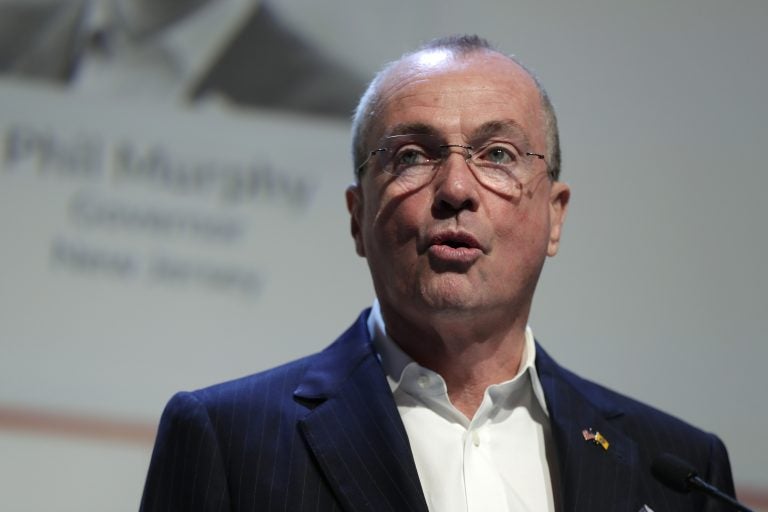As June 30 deadline looms, Murphy releases plan to reform EDA tax incentives
Murphy called for the current programs to be reformed after a major audit raised troubling concerns about the Economic Development Authority’s ability to administer them.

New Jersey Gov. Phil Murphy (Julio Cortez/AP Photo)
This article originally appeared on NJ Spotlight.
—
With even more controversy swirling around the state’s economic-development tax incentives this week, Gov. Phil Murphy and lawmakers still have to come up with a game plan for what comes next. And there’s little time left to iron out major differences.
Murphy has been calling for the current programs to be reformed after a major audit raised troubling concerns about the Economic Development Authority’s ability to administer them. News also broke this week that a grand jury is investigating potential criminal wrongdoing.
The governor said in a speech in Cherry Hill yesterday that he’s unwilling to “simply renew a set of incentive programs when serious questions exist about whether they have been successful.” He also released a long-awaited draft of a bill that would, among other changes, cap how much can be awarded to companies in a given year for job creation and new investment in New Jersey.
“What this is about is making sure we have policies in place that don’t just allow some to do well, but which allow entire communities to do well,” Murphy said.
Little time for fine tuning
But by releasing the legislation yesterday, Murphy, a Democrat, has given the Democratic-controlled Legislature little time to act: The existing tax-incentive programs are due to expire at the end of the month. Meanwhile, lawmakers have their own ideas about what to do next, and separate bills have been introduced in both the Assembly and the Senate that — given the time crunch — would simply extend the programs.
Potentially complicating matters will be negotiations on a new state budget, which also has to be enacted before the end of the month to avoid a government shutdown.
The state has been offering some form of economic-development incentives for over two decades, but it’s the latest versions of the tax breaks created by legislation in 2013 when former Gov. Chris Christie was in office that have generated the most controversy.
A special task force convened by Murphy earlier this year has taken testimony in recent weeks from whistleblowers who’ve suggested the incentives — which are designed to be awarded to companies for moving to, or not leaving, New Jersey — have been gamed.
Earlier this week, Politico New Jersey reported that the EDA has been issued a subpoena demanding information about tax breaks awarded to companies with ties to South Jersey powerbroker George Norcross. The influential Democrat is closely aligned with Senate President Steve Sweeney (D-Gloucester).
Separate reporting from WNYC and ProPublica this week also indicated the EDA has placed a hold on a tax break worth $260 million awarded to Camden-based Holtec International in response to questions that have been raised about the accuracy of information included in the company’s application for the incentive.
Inaccurate job count
Earlier this year, the Office of the State Comptroller released an audit that faulted the EDA for not having adequate documentation to prove companies that had already been given tax breaks had actually created the promised jobs.
While Norcross and his allies have denied any wrongdoing and are portraying Murphy’s criticism of the tax incentives and the task force’s work as an attack on Camden — a location where companies can qualify for the most lucrative tax breaks — Murphy said while speaking just miles away from Camden’s border yesterday that the discussion is not about “one city, one company, or one person.”
He went on to detail the ways his proposed legislation would remake the existing programs, including by capping at $400 million the total value of what can be awarded to companies in a given year. Murphy would also create new tax breaks to encourage historic preservation and brownfields redevelopment. Further, bonuses would also be given to companies that use union labor and sign project-labor agreements.
“I will not unilaterally disarm our economic development while our competitor states are luring businesses, in part, through incentives,” Murphy said.
“The overwhelming number of incentive recipients are good businesses and good corporate citizens,” he went on to say. “They have followed the rules and followed through on their promises.”
Praise from critics of the EDA
Afterward, Murphy’s speech drew praise from groups that have been calling for the tax incentives to be reined in.
“Hard caps on awards and stronger oversight will protect taxpayers and the state’s budget, while better targeting of awards and improved labor protections will ensure the benefits of corporate subsidies are shared broadly among business owners, their workers, and local communities alike,” said Brandon McKoy, president of New Jersey Policy Perspective, a liberal think tank based in Trenton.
But with the June 30 deadline now just weeks away, lawmakers have appeared to be more inclined to reinstate the existing programs — which are known as Grow NJ and ERG — with only modest changes. Bills that would grant extensions have already been introduced in both houses, with Assemblywoman Eliana Pintor Marin (D-Essex) and Sen. Teresa Ruiz (D-Essex) serving as sponsors.
Meanwhile, no one stepped forward immediately to introduce the draft legislation that Murphy released yesterday.
Pintor Marin has been a staunch advocate of the tax incentives and highlighted their impact on Newark in a recent opinion piece published by NJ.com.
“New Jersey has many of the components for growth, with our strategic location, well defined infrastructure and educated labor market,” she wrote. “However, we must continue to refine and develop important economic development tools, like Grow NJ, if we want to provide new opportunity for all of our residents.”
With only weeks to go before the existing programs expire, Michele Siekerka, president of the New Jersey Business & Industry Association, said yesterday that extending them or creating a “transitional arrangement” is critical given the competitive environment that exists among states.
“We urge the governor and the Legislature to work collaboratively to provide a temporary transition to a more permanent tax-incentive program solution before June 30,” Siekerka said.
WHYY is your source for fact-based, in-depth journalism and information. As a nonprofit organization, we rely on financial support from readers like you. Please give today.




